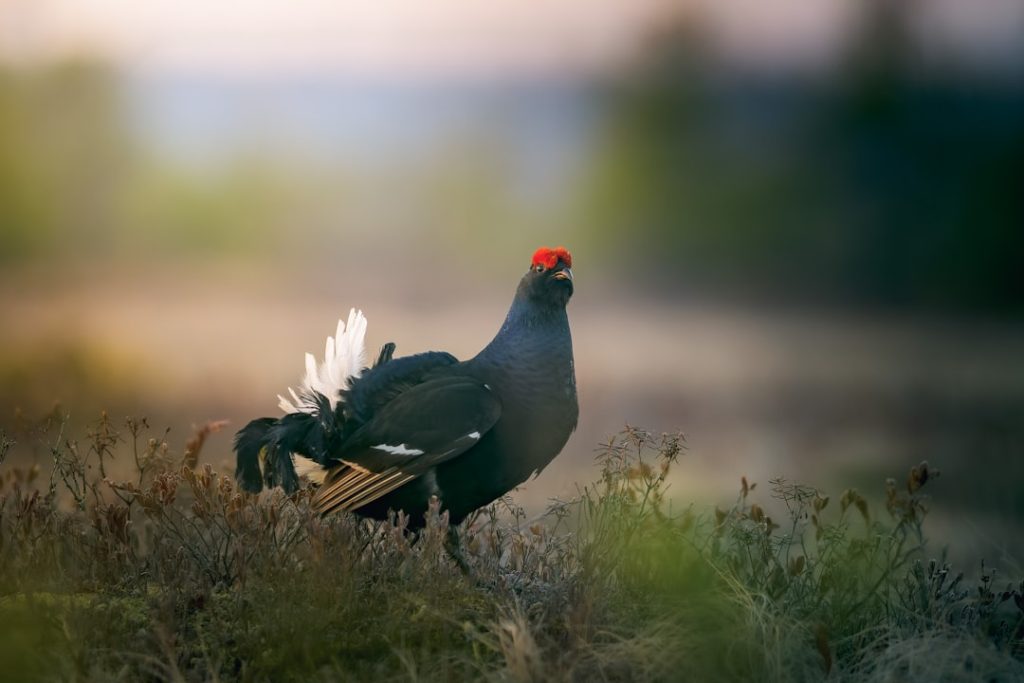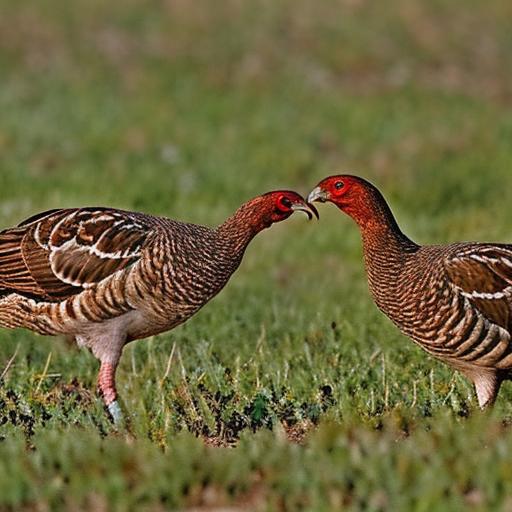Broodiness is a natural instinct in turkeys and other poultry that drives them to sit on a clutch of eggs in order to hatch them. When a turkey becomes broody, she will exhibit certain behaviors such as spending long periods of time on the nest, becoming more protective of her eggs, and even plucking out her breast feathers to create a warm space for the eggs. This behavior is driven by hormonal changes and is essential for the continuation of the species. Broodiness typically occurs in the spring and early summer when the days are longer and the weather is warmer, creating ideal conditions for hatching eggs.
Broodiness is an important trait for turkey breeders as it allows for natural incubation and hatching of eggs without the need for artificial incubators. However, not all turkey breeds exhibit broody tendencies, and some modern breeds have been selectively bred to minimize broodiness in favor of increased egg production. Understanding the factors that influence broodiness and knowing which breeds are more likely to exhibit this behavior is essential for successful turkey breeding.
Table of Contents
Key Takeaways
- Broodiness in turkeys is the natural instinct to sit on and hatch eggs, and it is more common in heritage breeds.
- Heritage breeds known for broodiness include Bourbon Red, Narragansett, and Royal Palm turkeys.
- Modern breeds that show broody tendencies include the Midget White and Beltsville Small White turkeys.
- Factors that influence broodiness in turkeys include genetics, age, and environmental conditions.
- To encourage broodiness in turkeys, provide a quiet and secluded nesting area with comfortable bedding and fresh eggs.
- Managing broody turkeys for successful hatching involves providing proper nutrition, protection from predators, and monitoring the incubation process.
- Dealing with non-broody turkey breeds may involve using an incubator to hatch eggs or considering crossbreeding with heritage breeds known for broodiness.
Heritage Breeds Known for Broodiness
Heritage turkey breeds are known for their strong broody tendencies, making them ideal for natural incubation and hatching of eggs. One such breed is the Bourbon Red, a popular heritage breed known for its excellent mothering abilities. Bourbon Red hens are known to go broody and will diligently sit on a clutch of eggs until they hatch. Another heritage breed that exhibits strong broody tendencies is the Narragansett. These turkeys are known for their calm and gentle nature, making them excellent mothers who will diligently care for their young.
The Standard Bronze is another heritage breed that is known for its broodiness. These turkeys are excellent foragers and have a strong maternal instinct, making them ideal for natural incubation and rearing of young poults. Heritage breeds are valued not only for their broodiness but also for their ability to thrive in outdoor environments and their rich, flavorful meat. For those looking to raise turkeys in a more traditional and sustainable manner, heritage breeds with strong broody tendencies are an excellent choice.
Modern Breeds That Show Broody Tendencies
While many modern turkey breeds have been selectively bred for increased egg production and faster growth, there are still some breeds that exhibit broody tendencies. One such breed is the Midget White, a modern breed that has been developed specifically for small-scale and backyard production. Midget White hens are known to go broody and will diligently care for their eggs until they hatch. This makes them an excellent choice for those looking to raise turkeys in a more natural and sustainable manner.
Another modern breed that shows broody tendencies is the Beltsville Small White. This breed was developed by the USDA for small-scale production and is known for its strong maternal instincts. Beltsville Small White hens will often go broody and make excellent mothers, making them a valuable choice for those looking to raise turkeys without relying on artificial incubation methods. While modern turkey breeds may not be as well-known for their broodiness as heritage breeds, there are still options available for those looking to incorporate natural incubation and hatching into their turkey breeding practices.
Factors That Influence Broodiness in Turkeys
Several factors can influence the likelihood of a turkey exhibiting broody behavior. One of the most significant factors is genetics, as certain breeds have been selectively bred for strong broody tendencies while others have been bred to minimize this behavior in favor of increased egg production. Additionally, individual genetics play a role, as some hens within a breed may be more prone to broodiness than others. Environmental factors also play a significant role, with longer daylight hours and warmer temperatures in the spring and early summer triggering hormonal changes that can induce broodiness.
Nutrition can also influence broodiness, as hens that are in poor condition or lacking essential nutrients may be less likely to exhibit broody behavior. Stress can also play a role, as turkeys that are exposed to high levels of stress may be less likely to go broody. Finally, the presence of a suitable nesting site can influence broodiness, as turkeys require a quiet, secluded space to build a nest and incubate their eggs. By understanding the factors that influence broodiness, turkey breeders can take steps to encourage this behavior in their flocks.
How to Encourage Broodiness in Turkeys
For those looking to encourage broodiness in their turkey flock, there are several steps that can be taken to create an environment conducive to this behavior. Providing suitable nesting sites is essential, as turkeys require a quiet, secluded space to build a nest and incubate their eggs. This can be achieved by providing nesting boxes or secluded areas within the coop where hens can build their nests away from disturbances.
Additionally, ensuring that hens are receiving a balanced diet with adequate nutrition can help encourage broodiness. Hens that are in good condition and receiving essential nutrients are more likely to exhibit broody behavior. Minimizing stress within the flock is also important, as high levels of stress can inhibit broodiness. Providing a calm and comfortable environment with plenty of space and access to fresh air and sunlight can help reduce stress levels within the flock.
Finally, selecting breeds with strong broody tendencies can also help encourage this behavior within the flock. By choosing heritage breeds or modern breeds known for their broodiness, turkey breeders can increase the likelihood of hens exhibiting this natural instinct. By taking these steps, turkey breeders can create an environment that encourages broodiness and natural incubation of eggs within their flock.
Managing Broody Turkeys for Successful Hatching

Once a turkey has gone broody, there are several steps that can be taken to ensure successful hatching of the eggs. Providing the broody hen with a quiet and secluded space where she can incubate her eggs without disturbances is essential. This can be achieved by providing a separate nesting area within the coop or by using a broody coop where the hen can sit undisturbed until the eggs hatch.
It’s important to regularly check on the broody hen to ensure that she is healthy and receiving adequate nutrition and water. Broody hens will often spend long periods of time on the nest and may be reluctant to leave to eat or drink, so it’s important to provide easy access to food and water within reach of the nesting area. Additionally, providing supplemental heat during cooler weather can help ensure that the eggs remain at a consistent temperature for successful incubation.
Once the eggs have hatched, it’s important to provide a safe and secure space for the mother and her poults. This can be achieved by providing a separate area within the coop or by using a brooder box where the poults can stay warm and protected until they are old enough to join the rest of the flock. By carefully managing broody turkeys and their young poults, turkey breeders can ensure successful hatching and rearing of new generations within their flock.
Dealing with Non-Broody Turkey Breeds
While some turkey breeds are known for their strong broody tendencies, there are also breeds that are less likely to exhibit this behavior. For those raising non-broody turkey breeds, artificial incubation methods may be necessary to hatch eggs and raise new generations within the flock. This can be achieved using an incubator to provide consistent temperature and humidity levels for successful egg incubation.
Additionally, fostering a nurturing environment within the flock can help encourage non-broody hens to exhibit more maternal behaviors. Providing plenty of space, access to fresh air and sunlight, and a balanced diet with adequate nutrition can help reduce stress levels within the flock and encourage more natural behaviors. While non-broody turkey breeds may require more intervention to successfully hatch eggs, with proper management and care, it is still possible to raise healthy new generations within the flock.
In conclusion, understanding broodiness in turkeys is essential for successful breeding and raising of new generations within the flock. By knowing which breeds are more likely to exhibit broody tendencies and understanding the factors that influence this behavior, turkey breeders can take steps to encourage broodiness within their flock. By carefully managing broody turkeys and providing a nurturing environment conducive to natural incubation and hatching of eggs, breeders can ensure successful reproduction within their turkey flock. For those raising non-broody turkey breeds, artificial incubation methods may be necessary, but with proper management and care, it is still possible to raise healthy new generations within the flock.
If you’re interested in learning more about turkey breeds and their broodiness, you might want to check out this informative article on PoultryWizard.com. The article discusses the different turkey breeds and their tendencies to go broody, providing valuable insights for poultry enthusiasts. You can find the article here.
FAQs
What are broody turkey breeds?
Broody turkey breeds are those that have a natural tendency to sit on and incubate their eggs in order to hatch them. This behavior is important for the reproduction of the breed.
Which turkey breeds are known for going broody?
Some turkey breeds that are known for their broody behavior include the Bourbon Red, Narragansett, and Royal Palm. These breeds are more likely to exhibit broodiness compared to others.
Do all turkey breeds go broody?
No, not all turkey breeds are known for going broody. Some breeds have been selectively bred for commercial production and may have lost the instinct to go broody.
What are the benefits of broody turkey breeds?
Broody turkey breeds can be beneficial for small-scale or backyard turkey farming as they can naturally incubate and hatch their eggs, reducing the need for artificial incubation methods. This can also help in preserving the genetic diversity of the breed.
How can I encourage broodiness in my turkey flock?
To encourage broodiness in your turkey flock, provide suitable nesting areas with privacy and comfort. Additionally, allowing the hens to have access to a natural environment and a variety of foods can also encourage broodiness.
Meet Walter, the feathered-friend fanatic of Florida! Nestled in the sunshine state, Walter struts through life with his feathered companions, clucking his way to happiness. With a coop that’s fancier than a five-star hotel, he’s the Don Juan of the chicken world. When he’s not teaching his hens to do the cha-cha, you’ll find him in a heated debate with his prized rooster, Sir Clucks-a-Lot. Walter’s poultry passion is no yolk; he’s the sunny-side-up guy you never knew you needed in your flock of friends!







